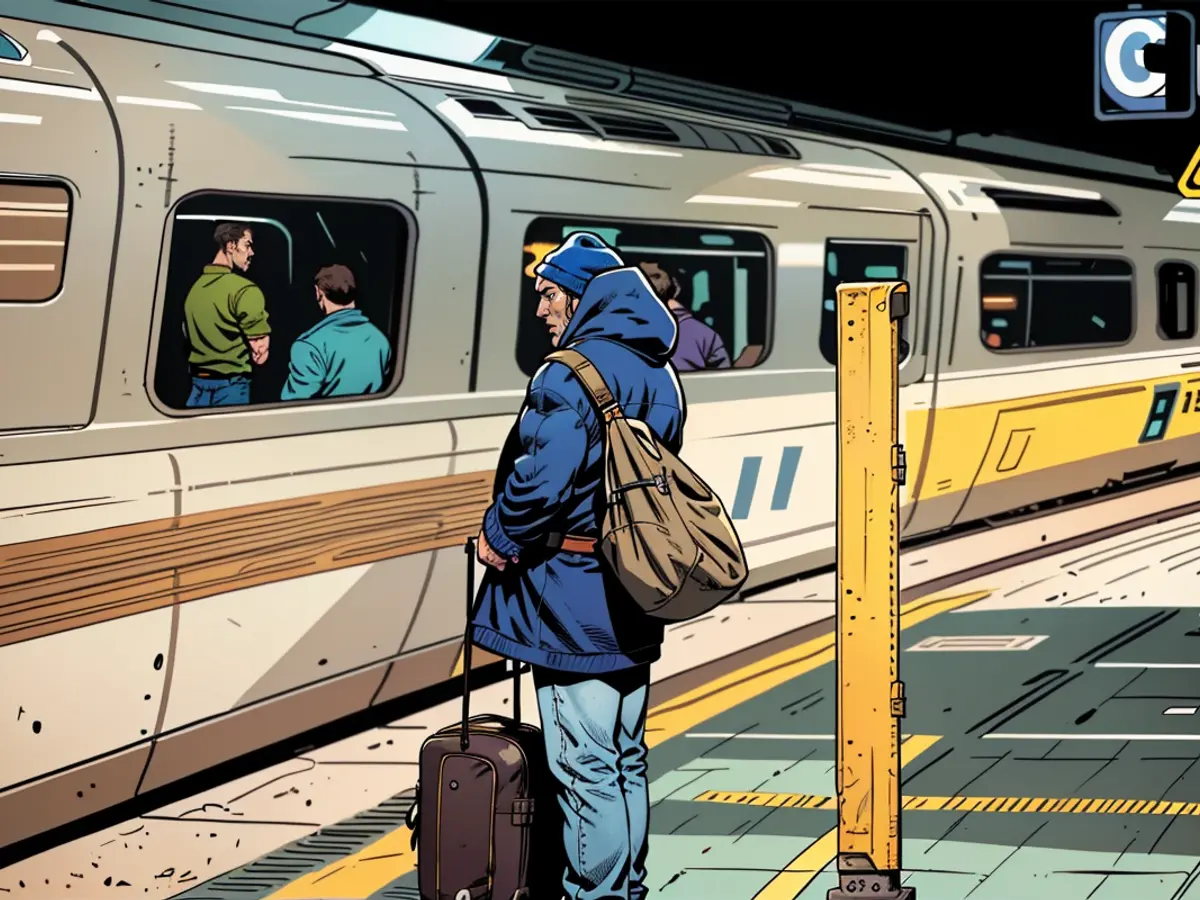Railway-Reliability - Every third long-distance train is delayed - railway collects annual goal
On the rails in Germany, there are many issues, which were apparent to millions of passengers even before the Football European Championship. In June alone, during the first phase of the tournament, nearly every second long-distance train was delayed, as the railway company announced. The punctuality record in the previous November was the worst in many years.
The railway's punctuality target for the current year has already been missed due to this. Originally, over 70 percent of trains were supposed to arrive on time in 2024. It is clear now that the annual punctuality will be significantly below this target. More than one in three long-distance trains were delayed in the first half of the year.
According to the railway company, only 62.7 percent of long-distance trains arrived on time without major delays in the first half of the year. This was almost six percentage points less than in the previous year's period. The passenger punctuality was not much better at 66.8 percent.
Unlike the operational punctuality, the passenger punctuality is evaluated based on the proportion of passengers who reached their destination without major delays. Delays of 15 minutes or more are considered significant. "Massive strikes, nationwide construction projects, and especially extreme weather conditions in the first half of the year to an unprecedented extent have pushed the numbers down," the railway company stated further.
Extreme weather in June
The extreme weather conditions caused significant problems for the railway and passengers, especially in June. "With an average of over 400 trains per day, more than twice as many long-distance trains were affected by external influences such as landslides, flooding, and dam failures than usual," it was stated. "This number was even 33 percent higher than the peak months during the flood disaster in the summer of 2021." There have never been so many weather-related delays on the railway.
Strikes and bad weather explain the railway's unreliability only in part. The company has been struggling with high delay rates for years. The main reason for this is the poor infrastructure, which has been worn down due to underfunding for decades. This was particularly evident during the Football European Championship.
Loud criticism after Football European Championship
For example, the Dutch team had to travel to the semi-finals by plane due to a delay of over two hours. At the beginning of the tournament, hundreds of Austrian fans were stranded in Bavaria because a construction site was not completed on time. Tournament chief Philipp Lahm missed the start of a match due to railway problems during the group stage.
The railway admitted to problems several times and apologized to passengers. However, the negative headlines led to loud criticism, even from politics.
General modernization will help
The railway criticism was so harsh that even competitors were forced to join in. "First and foremost, the Federal Government must come clean," said Peter Westenberger, CEO of the competitor association The Goods Railways, a few days ago. For years, criticism of declining quality and capacity on the rail network has been swept under the rug," he added. "Germany is still saving its railway, and that's why the EM traffic could not be the last embarrassment."
For some time now, there has been movement in the matter. The Bund intends to modernize the rail network with previously unknown billions of euros. Since this week, the comprehensive renovation of the Riedbahn between Frankfurt and Mannheim has been running. Until mid-December, the heavily trafficked corridor will be completely closed. After that, the section will be construction-free for several years.
According to this concept, 40 heavily frequented section segments are to be made fit again and punctuality is to be improved piecemeal by 2031. "With the renovation of the rail network, it will also become more resilient against extreme weather events," the railway announced. Not only football fans hope that the plan will go ahead.
The disruptions during the Football European Championship led to some football teams using alternative modes of transport, such as planes. during the tournament, a significant delay affected the Dutch team, forcing them to travel by plane for their semi-finals.
The scheduling of the European Football Championship added to the existing challenges for the German railway. The high volume of traffic during the tournament further strained the already unreliable railway system.
The poor punctuality record of the railway during the Football European Championship contributed to the railway's annual punctuality target being missed for the current year. The high delay rates during the first half of the year were a significant contributing factor to missing the target.
The railway company announced that the extremely weather conditions in June caused significant problems for long-distance trains and passengers. The number of weather-related delays during this time was unprecedented, resulting in the cancellation or diversion of many trains.
The railway admitted to the problems it faced during the European Football Championship and apologized to consumers for any inconvenience caused. The company acknowledged that the high delay rates and unreliability of the railway system were a issue that needed to be addressed.








